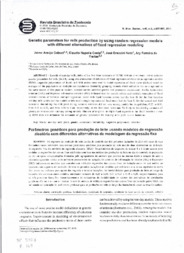Genetic parameters for milk production by using random regression models with different alternatives of fixed regression modeling.
Genetic parameters for milk production by using random regression models with different alternatives of fixed regression modeling.
Autoria: COBUCI, J. A.; COSTA, C. N.; BRACCINI NETO, J.; FREITAS, A. F. de
Resumo: Records of test-day milk yields of the first three lactations of 25,500 Holstein cows were used to estimate genetic parameters for milk yield by using two alternatives of definition of fixed regression of the random regression models (RRM). Legendre polynomials of fourth and fifth orders were used to model regression of fixed curve (defined based on averages of the populations or multiple sub-populations formed by grouping animals which calved at the same age and in the same season of the year) or random lactation curves (additive genetic and permanent enviroment). Akaike information criterion (AIC) and Bayesian information criterion (BIC) indicated that the models which used multiple regression of fixed lactation curves of lactation multiple regression model with fixed lactation curves had the best fit for the first lactation test-day milk yields and the models which used a single regression of fixed curve had the best fit for the second and third lactations. Heritability for milk yield during lactation estimates did not vary among models but ranged from 0.22 to 0.34, from 0.11 to 0.21, and from 0.10 to 0.20, respectively, in the first three lactations. Similarly to heridability estimates of genetic correlations did not vary among models. The use of single or multiple fixed regressions for fixed lactation curves by RRM does not influence the estimates of genetic parameters for test-day milk yield across lactations.
Ano de publicação: 2011
Tipo de publicação: Artigo de periódico
Unidade: Embrapa Gado de Leite
Palavras-chave: Legendre polynomial, Selection, Test-day milk yield, genetic correlation, heritability
Observações
1 - Por padrão são exibidas publicações dos últimos 20 anos. Para encontrar publicações mais antigas, configure o filtro ano de publicação, colocando o ano a partir do qual você deseja encontrar publicações. O filtro está na coluna da esquerda na busca acima.
2 - Para ler algumas publicações da Embrapa (apenas as que estão em formato ePub), é necessário ter, no celular ou computador, um desses softwares gratuitos. Sistemas Android: Google Play Livros; IOS: iBooks; Windows e Linux: software Calibre.
Acesse outras publicações
Acesse a Base de Dados da Pesquisa Agropecuária (BDPA) para consultar o acervo completo das bibliotecas da Embrapa.

